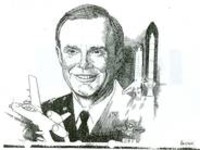Hall of Fame
Bridges, Jr., Major General Roy D.

Ambitious to fly, Roy D. Bridges, Jr., of Gainesville, Georgia, began his career in steep and rapid ascent. A distinguished graduate of the Air Force Academy in 1965, he received an M. S. degree in aeronautical engineering from Purdue University the following year, then reported to Williams AFB, Arizona, for pilot training. upon graduation, he was assigned to the 524th Tactical Fighter Squadron at Cannon AFB, New Mexico, for F-100 advanced training. In 1968, he joined the 416th Tactical Fighting Squadron at Phu Cat Air Base in Vietnam, where he flew 226 combat missions. After serving as a T-37 instructor with the 357th Pilot Training Squadron at Vance AFB, Oklahoma, he graduated at the top of his class at the USAF Aerospace Research Pilot School at Edwards AFB, California, in 1970. Assigned as pilot with the Air Force Flight Test Center, he worked on test projects including the A-X fly-off and subsequent test and evaluation of the A-IO. A distinguished graduate of the Air Command and Staff College in 1976, Bridges worked at Headquarters USAF Washington and then as special assistant to the Deputy Chief of Staff for Research, Development and Acquisition. He also served as assistant director of plans with Detachment 3, Air Force Flight Test Center, Nellis AFB, Nevada, prior to being chosen in 1980 for astronaut training at the Johnson Space Center, Houston, Texas. Bridges served as spacecraft communicator for four shuttle missions and piloted the Spacelab 2 shuttle mission. He logged 188 hours in space with 126 earth orbits and was scheduled to pilot a 1986 shuttle flight that was canceled following the Challenger mishap. From 1986 to 1993, he commanded the 6510th Test Wing at Edwards AFB, the Eastern Space and Missile Center at Patrick AFB, Florida, and the Air Force Flight Test Center at Edwards. He also served as Deputy Chief of Staff for Test Resources, Headquarters Air Force Systems Command, Andrews AFB, Maryland. In 1993, Bridges became Director of Requirements, Headquarters Air Force Materiel Command, Wright-Patterson AFB, Ohio. A command astronaut pilot with more than 4,460 flying hours, he was promoted to Major General January I, 1993. Awards and decorations: Defense Superior Service Medal (2), Legion of Merit (2), Distinguished Flying Cross (3), Meritorious Service Medal, Air Medal (15), Air Force Commendation Medal, and the Space Flight Medal
